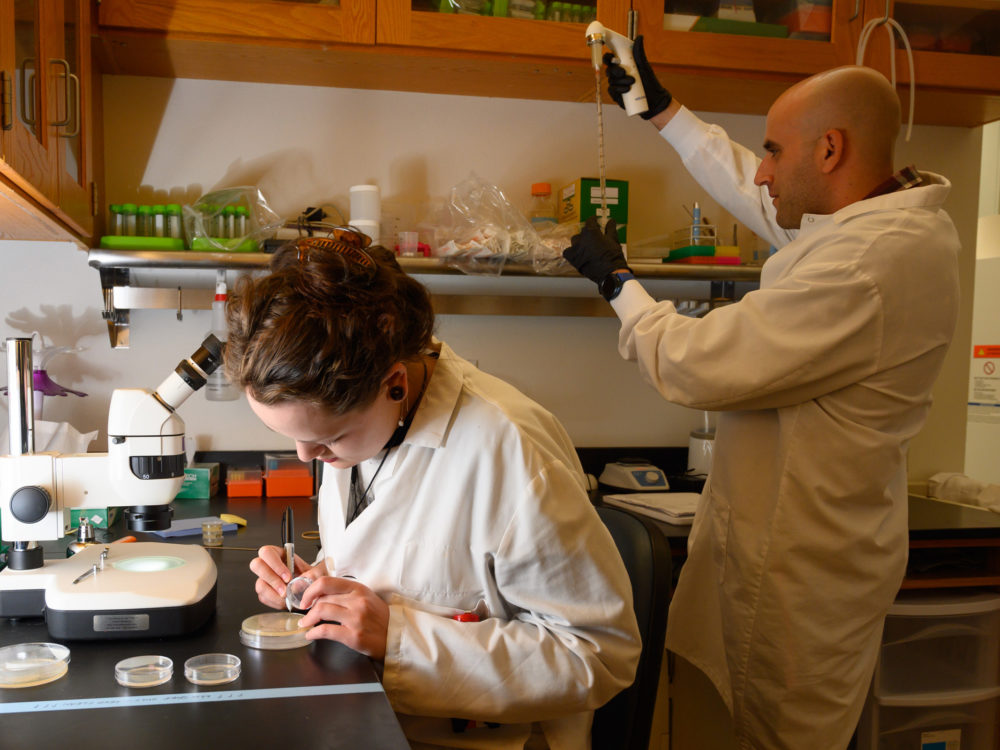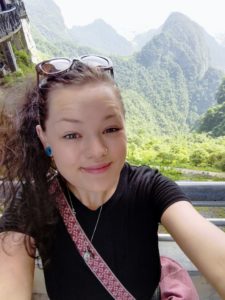
Aly Cavalier, a doctoral student in the Colorado State University Department of Health and Exercise Science, recently received major support for her study on the effects of chemotherapy on the brain. That support came in the form of a $20,000 Dean’s Fellowship from the CSU College of Health and Human Sciences.
“Chemobrain” is a common term used by cancer survivors to describe cognitive impairments that can occur during and after cancer treatment. While “chemobrain” is very common, the cause of it is still unknown. Cavalier is conducting research aimed at better understanding the potential effects of chemotherapy on neurons, with the hope to identify possible treatment approaches for the condition.
Cavalier, mentored by Assistant Professor Tom LaRocca, is one of two graduate students who earned the 2020-2021 College of Health and Human Sciences Dean’s Fellowship. The other student is Reagan Miller in the Department of Human Development and Family Studies. The fellowship, newly established this year, is a competitive opportunity that supports outstanding doctoral students pursuing research-related careers in their discipline.
About Aly Cavalier

Read the interview below to learn more about Cavalier and her research.
Tell us about your background and what compelled you to apply to become a CHHS Dean’s Fellow.
A: I got my B.A. at CU Boulder, studying Integrative physiology and neuroscience. Both during my undergraduate career and full-time after graduation, I worked in a lab that studies neurodegenerative diseases like ALS and Alzheimer’s. At CSU, I’ve continued to focus on mechanisms of brain aging. I applied to become a fellow because I think the work we’re doing is important, and this is a great opportunity to help me focus on it.
What are you researching?
In general, I study the biology of healthspan and how we can keep people healthier for longer as they age. In this fellowship, I will be researching the cognitive impairments associated with chemotherapy, which many cancer patients experience and are often called ‘chemobrain’. Doxorubicin is one of the most commonly used chemotherapies that may cause ‘chemobrain,’ but how it does so is still unknown because the drug isn’t thought to cross the blood-brain barrier. This means that we don’t know the direct effects of doxorubicin on the brain, which is why I’ll be studying how it affects neurons in vitro–to get a better readout of what it might be doing at the biological level.
Can you explain why it is important to find a viable strategy for preventing the adverse effects of chemotherapy drugs in human neurons?
Finding therapeutics to help prevent ‘chemobrain’ is crucial, because the condition has a severe impact on patient quality of life, and some data even suggest it can increase risk for dementia and other neurodegenerative diseases.
What inspired you to focus on this research? What do you aim to achieve in your research and what will the ultimate impact be for improving peoples’ lives?
Cancer is the second leading cause of death in the U.S., and more than 30% of cancer patients receive chemotherapy. So, there are many people who may experience “chemobrain,” and it can really reduce the quality of life and make it difficult for them to be active within their communities. We’re hoping that by understanding the potential effects of chemotherapy on neurons (and the brain), we might be able to help identify treatment approaches for the condition.
What aspects of your college education helped you prepare to do your research?
During my undergraduate career, I worked in a lab that studies aging, investigating the role of oxidative stress resistance in aging, and I also studied the molecular biology of neurodegenerative diseases like ALS and Alzheimer’s. I continued to work on neurodegeneration after graduation, which furthered my understanding of neurotoxicity and the process of brain aging. That, combined with my coursework in neuroscience, is what really prepared me for this.
How have your mentors help guide you throughout your educational career?
I’ve been very lucky to have a couple of really great mentors. Before I had research experience, I thought I wanted to go to medical school, but it was only after I got involved in research that I realized how much I enjoy the problem-solving aspect. My mentors have always had a strong sense of direction for their work and have taught me how to explain why something is important to others, but they have also been willing to entertain my ideas and support me as I pursue them.
The Department of Health and Exercise Science is part of CSU’s College of Health and Human Sciences.